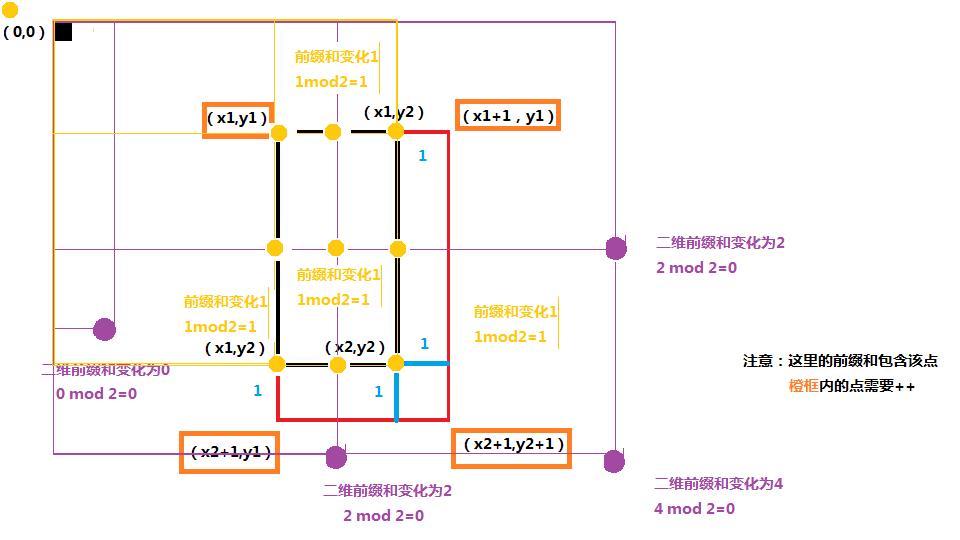date:公元2017年7月19日适逢周三;
location:清北集训 杭州
point:二维树状数组/二维差分
Matrix
| Time Limit: 3000MS | Memory Limit: 65536K | |
| Total Submissions: 28325 | Accepted: 10341 |
Description
Given an N*N matrix A, whose elements are either 0 or 1. A[i, j] means the number in the i-th row and j-th column. Initially we have A[i, j] = 0 (1 <= i, j <= N).
We can change the matrix in the following way. Given a rectangle whose upper-left corner is (x1, y1) and lower-right corner is (x2, y2), we change all the elements in the rectangle by using "not" operation (if it is a '0' then change it into '1' otherwise change it into '0'). To maintain the information of the matrix, you are asked to write a program to receive and execute two kinds of instructions.
1. C x1 y1 x2 y2 (1 <= x1 <= x2 <= n, 1 <= y1 <= y2 <= n) changes the matrix by using the rectangle whose upper-left corner is (x1, y1) and lower-right corner is (x2, y2).
2. Q x y (1 <= x, y <= n) querys A[x, y].
We can change the matrix in the following way. Given a rectangle whose upper-left corner is (x1, y1) and lower-right corner is (x2, y2), we change all the elements in the rectangle by using "not" operation (if it is a '0' then change it into '1' otherwise change it into '0'). To maintain the information of the matrix, you are asked to write a program to receive and execute two kinds of instructions.
1. C x1 y1 x2 y2 (1 <= x1 <= x2 <= n, 1 <= y1 <= y2 <= n) changes the matrix by using the rectangle whose upper-left corner is (x1, y1) and lower-right corner is (x2, y2).
2. Q x y (1 <= x, y <= n) querys A[x, y].
Input
The first line of the input is an integer X (X <= 10) representing the number of test cases. The following X blocks each represents a test case.
The first line of each block contains two numbers N and T (2 <= N <= 1000, 1 <= T <= 50000) representing the size of the matrix and the number of the instructions. The following T lines each represents an instruction having the format "Q x y" or "C x1 y1 x2 y2", which has been described above.
The first line of each block contains two numbers N and T (2 <= N <= 1000, 1 <= T <= 50000) representing the size of the matrix and the number of the instructions. The following T lines each represents an instruction having the format "Q x y" or "C x1 y1 x2 y2", which has been described above.
Output
For each querying output one line, which has an integer representing A[x, y].
There is a blank line between every two continuous test cases.
There is a blank line between every two continuous test cases.
Sample Input
1 2 10 C 2 1 2 2 Q 2 2 C 2 1 2 1 Q 1 1 C 1 1 2 1 C 1 2 1 2 C 1 1 2 2 Q 1 1 C 1 1 2 1 Q 2 1
Sample Output
1 0 0 1
Source
POJ Monthly,Lou Tiancheng
题目翻译(有道滋滋)
给一个N * N矩阵,其元素是0或1。(i,j)意味着i行和j列数。一开始我们有一个(i,j)= 0(1 < = i,j < = N)。
我们可以改变矩阵以以下方式。给定一个矩形的左上角(x1,y1),右下角(x2,y2),我们改变矩形中的所有元素用“不”操作(如果它是一个' 0 '然后改变它为' 1 '否则改变成“0”)。保持矩阵的信息,你被要求写一个程序接收和执行两种指令。
1。C(x1,y1 x2 y2 x1 < = x2(1 < = < = n,1 < = y1 < = y2 < = n)变化矩阵,利用矩形的左上角(x1,y1),右下角(x2,y2)。
2。Q x y(1 < = x,y < = n)查询(x,y)。
我们可以改变矩阵以以下方式。给定一个矩形的左上角(x1,y1),右下角(x2,y2),我们改变矩形中的所有元素用“不”操作(如果它是一个' 0 '然后改变它为' 1 '否则改变成“0”)。保持矩阵的信息,你被要求写一个程序接收和执行两种指令。
1。C(x1,y1 x2 y2 x1 < = x2(1 < = < = n,1 < = y1 < = y2 < = n)变化矩阵,利用矩形的左上角(x1,y1),右下角(x2,y2)。
2。Q x y(1 < = x,y < = n)查询(x,y)。
输入
输入的第一行是一个整数X(X < = 10)代表测试用例的数量。以下X块每个表示一个测试用例。
每一块的第一行包含两个数N和T(2 < = N < = 1000,1 < = T < = 50000)代表矩阵的大小和数量的指示。以下T行每个代表一个指令的格式“Q x y”或“C x1 y1 x2 y2”,上面所描述的。
每一块的第一行包含两个数N和T(2 < = N < = 1000,1 < = T < = 50000)代表矩阵的大小和数量的指示。以下T行每个代表一个指令的格式“Q x y”或“C x1 y1 x2 y2”,上面所描述的。
输出
为每个查询输出一行,一个整数代表一个(x,y)。
之间有一个空行每两个连续的测试用例。
之间有一个空行每两个连续的测试用例。
样例输入
1
2 10
C 2 1 2 2
Q 2 2
C 2 1 2 1
Q 1 1
C 1 1 2 1
C 1 2 1 2
C 1 1 2 2
Q 1 1
C 1 1 2 1
Q 2 1
样例输出
1
0
0
1
题解:据说本题是用数学方法来做,但是oycy大学霸+lsh大学霸好像在我写这篇题解之前已经研究了2个小时了……
再说那天的数学听得我对数学没有信心了,所以压根就没想到数学;
不是说数学不可以,但是太过困难了(深切感受),
一想到数学便睡意袭来,
然后大概花了40分钟便想出一个基于二维树状数组的思路:
现在我们设需要not变换的子矩阵左上坐标为(x1,y1)右下坐标(x2,y2)
不妨拓展1格,方便我们解题,先看到一幅图(拓展后)
注意到左上方有一个小黄人(这没什么用,请自行过滤)
黑方框为(0,0)

黑方框代表我们需要not的区域 红方框代表拓展出来的区域
TIPS:红方框边界上的点没画(lazy++),自己推吧,懒得画了,符合的。
在我的解题方案中,我们只要将点(橙框的4点)++
a[x1,y1]++
a[x2+1,y1]++
a[x1+1,y1]++
a[x2+1,y2+1]++
可以证明在黑方框外的任一点的二维前缀和的增量r mod 2 恒等于 0
而黑方框内的任一点的二维前缀和的增量r mod 2 恒等于 1
当然这是对于第一下C,当然基于第2~q次,同理,我们可以通过增量r mod 2=0 or 1,来判断该点到底是 1 还是 0
需要注意的,我们来简化问题,就是因为初始值为0所以我们不需要求坐标增量r只需要求出前缀和w即可
二维前缀和的最快维护方案是二维树状数组;具体维护不在多讲(本质是为树状数组+循环)
这样我们只要使4个点的权值++,维护前缀和,求Q(x,y)只要C(x,y)mod 2=1 则最终的点(x,y)就是1,反之就是0
做完了~~
用not 来维护树状数组你就中陷阱了;
或者用dp来做,也是行不通的;
希望lsh+oycy大学霸orz能够早日用数学AC本题!
就是该算法的时间复杂度的分析在程序后,请自行查看。
代码:
uses math; var n,m,i,j,t,x1,x2,y1,y2,q,x,y,tt,ii:longint; c:array[0..1000,0..1000]of longint; ch:char; function lowbit(x:longint):longint; begin exit(x and (-x)); end; procedure update(xx,yy,opx:longint);//二维树状数组把数组中a[xx]+yy并且跟新树状数组c[] var ty,x,y:longint; begin x:=xx; y:=yy; ty:=yy; while x<=n do begin y:=ty; while y<=n do begin c[x,y]:=c[x,y]+opx; y:=y+lowbit(y); end; x:=x+lowbit(x); end; end; function query(x,y:longint):longint;//询问a二维矩阵a[]前缀和 var sum,ty:longint; begin sum:=0; ty:=y; while x>0 do begin y:=ty; while y>0 do begin sum:=sum+c[x,y]; y:=y-lowbit(y); end; x:=x-lowbit(x); end; exit(sum); end; begin readln(tt);//tt组数据 for ii:=1 to tt do begin readln(n,q);//n*n矩阵,q个操作 for i:=1 to q do begin read(ch);//ch为指示符 case ch of 'C':begin readln(x1,y1,x2,y2); update(x1,y1,1); update(x1,y2+1,1); update(x2+1,y1,1); update(x2+1,y2+1,1);//4个橙色的点依次更改 end; 'Q':begin readln(x,y); writeln(query(x,y) mod 2);end;//判断mod 2?=1 end; end; writeln; end; end.
我们来计算时间复杂度:
对于1次程序tt++前完成,q个询问,
如果是Q则复杂度是O(log n) 如果是C则复杂度为O(4 log n),最坏时间复杂度为O(4 log n)
那么对于1次完整的解决,我们最坏的时间复杂度为O (4q log n)
对于完整的tt次解决,最坏的时间复杂度是O(4*q*tt*log n)
2 <= N <= 1000, 1 <= q<= 50000; tt<=10;
那么最坏情况的常数为O(4*50000*10*10)=O(2000w)
没有超时,完美解决!
希望lsh+oycy大学霸orz能够早日用数学AC本题!
